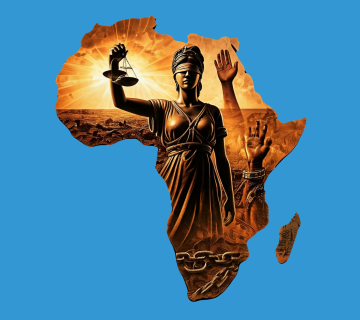The Republic of Somalia is an attractive country to many conflicting interests both in the Horn of Africa region and those far away. Within the Horn, it competes with some of its neighbours for geopolitical notoriety. It is of geostrategic value to powers beyond the Horn of Africa who then compete to position themselves inside Somalia in order to influence events in Mogadishu. They pay attention to elections and the likely winner. There was such an election in Mogadishu on Sunday, May 15, 2022, in which 328 clan representatives in the House of the People (HOP), returned Hassan Sheikh Mohamud to the presidency and defeated sitting President Mohamed Abdullahi Mohamed Farmaajo. Mohamud switched positions with Farmaajo. He is supposedly wiser than before and thus has a chance to reset Somalia in a positive way; away from being the source of tribulations and regional mischief.
The neighboring countries, Kenya among them, are watching carefully to see what the return of Mohamud would mean for the region. Curiosity over Mohamud’s reappearance might explain leaders who attended the inauguration ceremony on June 9, 2022. Kenyan President Uhuru Kenyatta was there, satisfied that his preferred candidate won. Djibouti President Ismail Omar Guelleh enjoyed being there. Egypt’s sent Prime Minister Mostafa Madbouly was also there to offer assistance against terrorism and to ensure that Egypt’s strategic interests in the Red Sea and Bab el-Mandeb Strait are secured and most importantly, to reignite good relations. In his previous presidency, Mohamud had visited Egypt several times and forged such close ties that Cairo opened an embassy in Mogadishu in 2014 and stopped operating from Nairobi. Farmaajo had discarded those close ties as he embraced Turkey, Egypt’s power rival.
Probably, the regional leaders that were most disappointed in Farmaajo’s loss were Prime Minister Abiy Ahmed of Ethiopia and Eritrea’s Isaias Afwerki. Abiy attended the inauguration but Afwerki did not. Those in Tigray felt good that Farmaajo lost. Abiy and Afwerki had forged a tripartite alliance comprising Eritrea, Ethiopia, and Somalia and Afwerki had appeared to be the leader of the three. Farmaajo had become so close to Afwerki that he secretly sent over 5,000 Somalis to be trained as soldiers in Eritrea in 2019. Given that other countries, like Turkey train Somalia soldiers, the secrecy was the puzzle. Initially, the recruits believed they were going to Qatar only to end up in Eritrea, and some of them reportedly fought for Ethiopia-Eritrea against Tigray. It remains to be seen how Mohamud will handle the issue of Somalia soldiers in Eritrea, the different trainings for Somalia soldiers, and assorted power rivalries.
Kenya is very interested in Mohamud’s evolving policies and how different they would be from Farmaajo’s anti-Kenya nationalism. This interest goes back to the early days of post-colonialism when independent Somalia tried creating a new national identity through a losing irredentist doctrine to glue people together at the expense of Kenya, Ethiopia, and Djibouti. This led to two losing wars which melted the ‘glue’. First, was a Somalia-Kenya quasi-war labelled ‘shifta’ and the second was a Somali-Ethiopian War, the Ogaden War. With the melting of the ‘glue’, Somalia disintegrated largely into its colonial identity fragments. Controlled by warlords, Somalia became a haven for assorted terrorists such as the Al-Shabaab, a proxy for extra-continental geopolitical power games, and of increased security concern for Kenya.
Kenya had closely followed developments in Somalia, hosted the Somalia government in Kenya, and participated in the making of the 2011 Somalia Provision Constitution which allowed autonomy among the various states and established the Federal Government of Somalia (FGS) in 2012. Hassan Sheikh Mohamud was elected president under the system and appeared to be beholden to powerful extra-continental states which jumped in to ensure that the new FGS did what they wanted. Three years later, in 2017, Mohamud was dethroned by Mohamed alias Farmaajo who blundered by trying to centralise power and by entering into a three-way anti-Kenya alliance involving Eritrea and Ethiopia. Farmaajo was reluctant to hold elections which were delayed for more than a year, from February 2021 to May 2022. It was not the first time that Farmaajo had tried to manipulate the electoral system to prolong his stay in power. He had tried it among the Somali Americans in 2007 in Buffalo, New York.
Since in his first term, Mohamud turned Somalia into an anti-Kenya proxy for extra-continental geopolitical mischief, Kenya should be watchful. It has an interest in Somalia’s relations with Turkey and the United States. Turkey knows what it wants, the United States is ambivalent. It refuses to have the Al-Shabaab declared a terror organization and still wants to appear fighting that terror group. It put pressure on Farmaajo’s government that enabled the election. The Biden Administration welcomed Mohamud’s return to power by offering to return the troops that President Donald Trump had withdrawn. In doing so, the United States is seemingly close to Kenya’s position of supporting the positive Somali election outcome while adopting Careful Engagement approach on matters of security in Eastern Africa.
Careful Engagement is necessary partly because Mohamud is likely to be under much external pressure. Despite the number of foreign troops from Turkey, the United States, and the African Union claiming to help keep the peace, security is not secured. Besides the Al -Shabaab being a force to reckon with throughout the country, there remains the challenge of conflicting defence philosophies that the Somali military goes through. Mohamud needs new thinking to help develop a grand strategy that would harmonize incompatible military philosophies.
Kenya, being an interested party and a regular victim of Somalia-generated mischief also has to do some serious rethinking about Somalia and the region. It would hope that Faormaajo’s sense of insecurity, his secret soldier training in Eritrea, and propensity to change the rules of political games will be discarded. Kenya will have to do this being aware of conflicting geopolitical interests in Somalia involving Turkey, the United States, Britain, the EU, Egypt, Arab countries, and China. It would expect that, within Africa, Mohamud would avoid Farmaajo’s blunders as he balances the interests of Egypt with those of Ethiopia and Turkey; they all consider Somalia of strategic importance. He so far shows signs of balancing, having praised Turkey, he made his first foreign visit to the United Arab Emirates, Egypt’s ally. With the Careful Engagement approach, therefore, Kenya can help Muhamud to remain an ally and to reduce the possibility of intensifying Somalia’s role as a proxy for competing powers. Despite past differences, Mohamud’s election opens a new and welcome chapter of potential stability in the Horn.
Prof. Macharia Munene is Associate Fellow, Diplomacy, Geopolitics, and Foreign Relations at the HORN Institute
Photo: Former President Mohamed Abdullahi Farmajo receives incoming President Hassan Sheikh Mohamud at Presidential Palace on May 17, 2022 (Photo Credit: Hassan Sheikh Mohamud/Twitter)
The contents of this blog are copyright of © The HORN Institute 2022. All rights reserved. Any redistribution or reproduction of part or all of the contents in any form and for whatever reason is prohibited. You may use the content of this blog for personal reasons, but acknowledge the author and cite the website as sources of the material.



